
Should You Be Scared Of Detection Dogs?
Detection dogs. These two words are enough to instill fear in even the most stoic of stoners. But is there anything to worry about? And how can you make your way past these canines without being singled out? Find out in this article.
If you’re a stoner, seeing a detection dog can be unsettling. Even if you don’t have herb on you, locking eyes with a pup trained to single out drug users can be enough to get the heart racing. This is especially true in places where cannabis legalization has yet to be implemented.
You’ll likely see detection dogs, or "sniffer dogs", in places where illicit substances are potentially present or being transported. It could be in an airport, in public transport spaces, or at a huge event like a music festival.
But how exactly are these detection dogs trained? What substances are they looking for, and how do they do it? Most importantly, should you be scared of them? This short article should answer these questions.
Where are detection dogs employed?
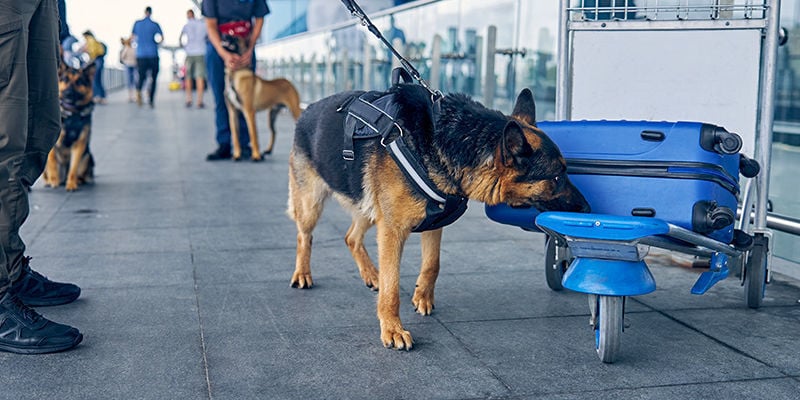
As mentioned, detection dogs are usually stationed in public places where recreational substances may be abundant and passed around. Airports, for one, are a haven for smuggling illicit drugs into other territories, which is why deploying detection dogs is reasonable.
Certain country borders are also a spot for detection dogs. This is especially true in “hot spots” like the Mexico–US border, which is one of the main throughways for hard drug transport.
Music festivals, meanwhile, are a hotbed for recreational substances like ecstasy and cannabis. Because of this, you’ll likely spot a canine or two at the entrances of the festival grounds. In some cases, the same goes for certain sporting and entertainment events.
Furthermore, police officers also have detection dogs working for them. You may see them patrolling the streets with their trusty canines in front of them. Police dogs are usually deployed in special cases, or if random stop and searches are required.
What are these dogs trained for?
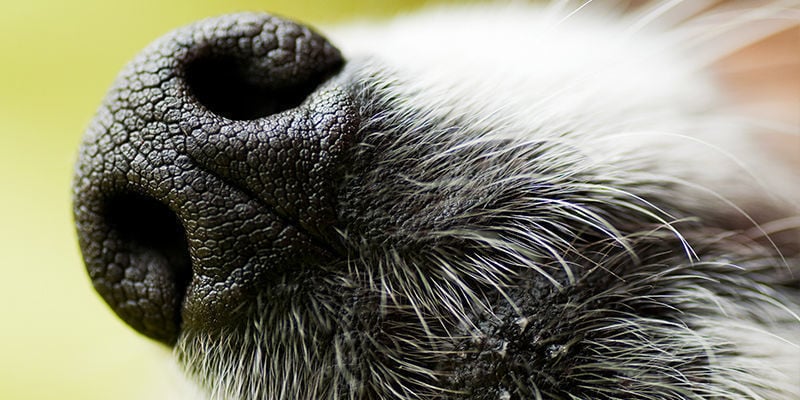
Detection dogs are trained to literally sniff out contraband. Outside of illegal drugs, they are also equipped to detect explosives, illicit currency, and blood. And during the COVID-19 pandemic, Australia, for one, used dogs to detect the virus' presence in the human body.
As for illicit substances, detection dogs don’t only go after cannabis; indeed, it’s quite a long list that includes heroin, cocaine, ecstasy, MDMA, ketamine, methamphetamine, and even LSD.
There’s a common belief that dogs can only detect one substance at a time. But according to former army dog trainer Roger Flett, sniffer canines can be trained to detect several scents—around six to seven—as well as the scents of certain drug derivatives (Buchanan, 2021). So if a dog can sniff out MDMA or cocaine, it would likely be able to detect crack cocaine and ecstasy pills.
How dogs work at airports
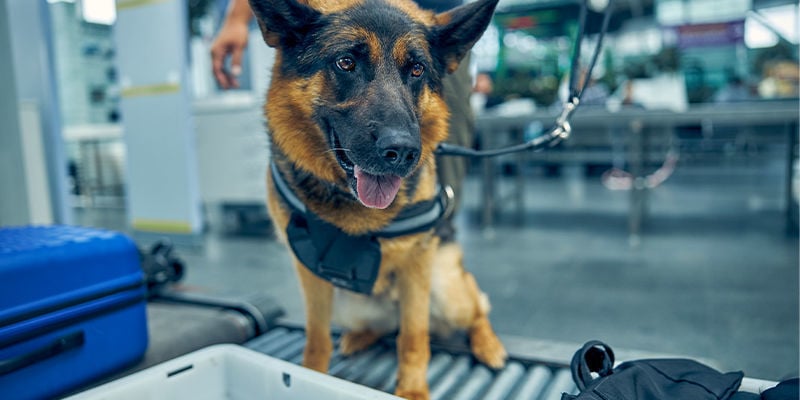
When it comes to deploying detection dogs at airports, the operation is quite elaborate. For one, there are multiple stations where these canines are placed.
For the drug screening area, these dogs are guided by their respective handlers. They work under the radar to not tip off potential suspects. Once a dog senses the presence of an illicit substance, they don’t bark or make any noise. Oftentimes, they simply sit on a suspect’s luggage to indicate a red flag. They can also work through multiple bags at the same time, which means their presence isn’t always felt.
For the explosives and firearms screening area, dogs are trained to detect gunpowder and specific chemicals. For humans, these substances are undetectable, but for a dog, they are easy to find.
Dogs are also trained to spot illegal contraband that isn’t necessarily a security risk. This could be meat and raw food products from another country, which are often prohibited.
How to avoid detection at an airport
There are a few ways to avoid detection—staying away from the dogs being one of them. Unfortunately, this is not always possible. Another way is to not have anything illegal on you while at the airport, as the repercussions can be significant.
But if you do choose to travel with cannabis, edibles are your best bet. While there’s still a small chance that a dog may catch it, there’s a bigger chance they won’t, since marijuana’s chemical compounds change when cooked or infused into a food product.
How dogs work at festivals
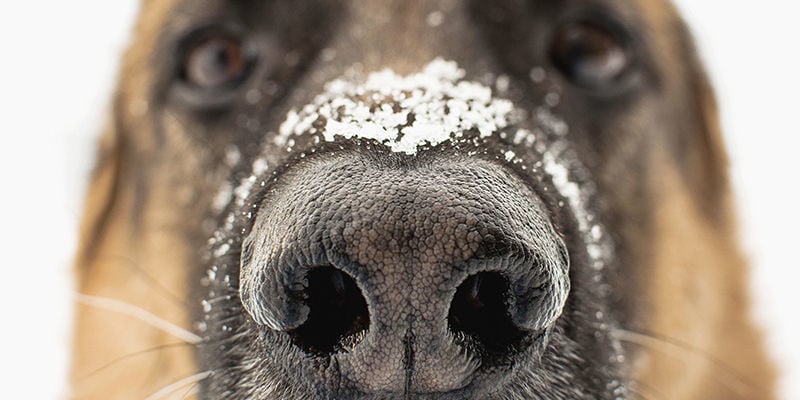
When it comes to festivals and detection dogs, it is understandably a smaller-scale operation. These canines are usually situated by the entrance of festival grounds.
But in a city like London, for example, two types of detection dogs are deployed at music festivals. One is a more aggressive breed like a German Shepard, which is mainly for crowd control. The other dogs are meant for sniffing out illegal substances. Just like how it’s done in airports, they are not meant to draw any attention to themselves.
How to avoid detection at a festival
Likewise, the best way to avoid detection at a music festival is to not have anything on you. With this in mind, some people choose to use their substance of choice before entering the festival grounds (though be sure you’re not too intoxicated to alert any suspicion upon entrance), while others leave things up to chance and hope they can successfully smuggle their stash through security.
Timing is also key. A dog can only do so much sniffing in the span of an hour. Especially if they are older dogs and it's a hot day at a music festival, they will become less alert and effective over time. So if you’re seeing the same dog at the entrance the entire time, they’ve likely checked out already. This would be your best chance to enter without issue.
Can detection dogs sniff through odour-proof bags?
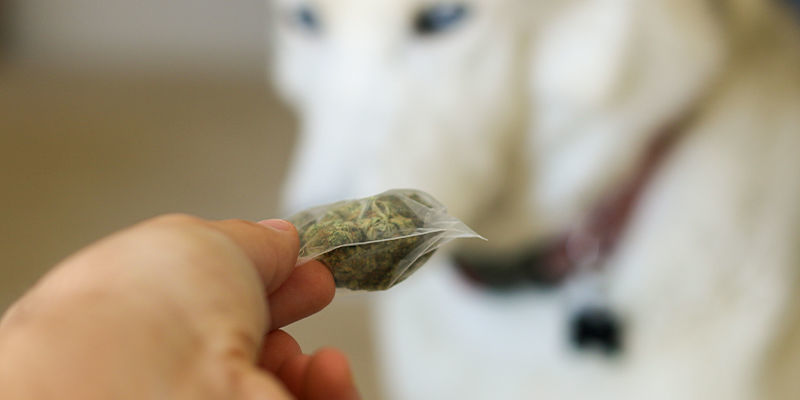
Whether at an airport, festival, or elsewhere, will dedicated odour-proof bags provide sufficient protection from the trained noses of sniffer dogs? Some experts say that, yes, these vessels can be quite effective in blocking a dog's ability to detect various drugs (Law, 2019). But we're not just talking about any tightly sealed bag; odour-proof bags are those with an activated carbon lining (and often feature non-woven fabric on the exterior), which is also used to eliminate smells in other home and commercial applications.
While these vessels are not 100% effective, you'd be smart to travel with an odour-proof bag if you plan on taking an illicit substance with you—regardless of where you're going.
Do detection dogs really benefit the public?
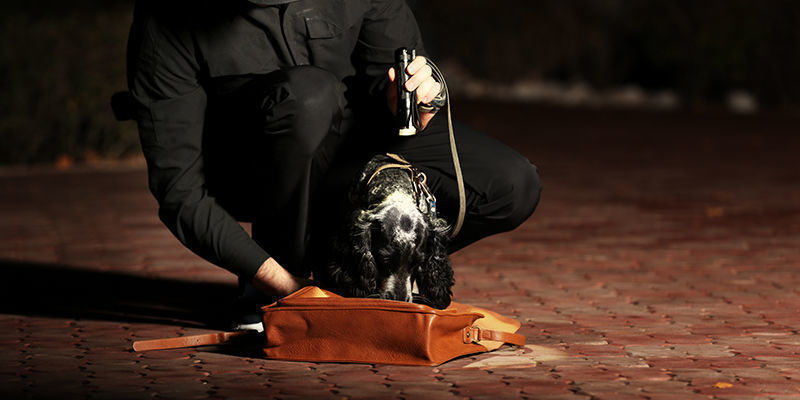
Sentiments are split right down the middle. Research shows that detection dogs are effective at spotting explosives, provided they are given ample training (Lazarowski et al., 2020). For this reason, a good amount of people feel safer in their presence, especially in airports.
But there are also downsides, chief among them being the anxiety caused by being scrutinised in already-stressful public places. While this fear is certainly present among those smuggling illicit substances, there are instances in which dogs may target individuals not performing any sort of illegal activity.
Furthermore, as mentioned, in a festival setting, detection dogs are causing some festival-goers to “preload” before entrance, which can result in people taking more of a drug than they should, potentially culminating in adverse outcomes.
According to anecdotal accounts, certain people also find the experience to be traumatising, especially when taken to be strip-searched following detection (Martin, 2019). This is true for people who have no drugs on their person as well as those smuggling illicit substances. Some dogs are even affected by the biases of their handlers, which is also problematic (Watkins, 2021).
It’s worth noting that a detection dog’s ability to single out an illicit substance depends on several factors. As mentioned above, fatigue can play a role, especially if the dog has been working for hours. This is why it is recommended that they work for 20 minutes, followed by a 20-minute break, and so on. A working period of over one hour, without rest, is thought to produce diminishing returns.
If we look at the statistics, it's clear that the chances of detection aren’t always favourable. During a 2008 operation at the UK’s Latitude Festival, it was found that only 12% of searches resulted in a find. Likewise, 2016–2017 data from South Australian police showed a success rate of a mere 15% (Buchanan, 2021).
The truth about detection dogs
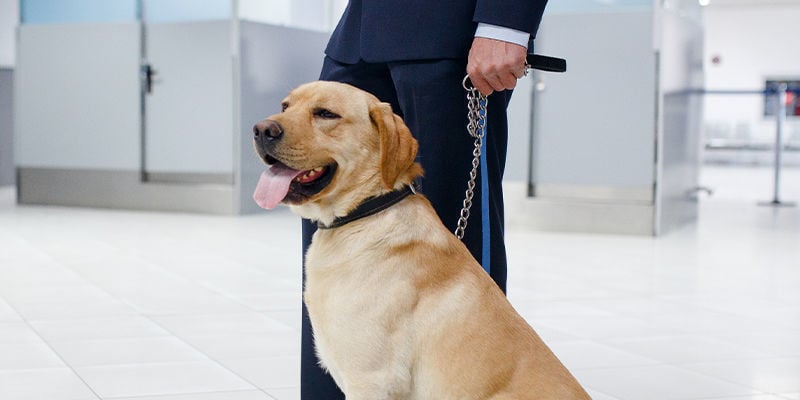
Detection dogs aren’t machines, and the chances of them committing a mistake are rather high. And whether or not you are carrying an illicit substance, being subjected to detection is an uncomfortable experience.
But just remember this: you will only be stopped due to reasonable suspicion that you are carrying something illegal. That said, it would benefit you to act as nonchalantly as possible if you want to avoid detection.
If you can, avoid having anything illicit on you to save yourself the potential headache and hassle. Otherwise, consider picking up an odour-proof bag to reduce your chances of detection.
- Buchanan, & R. (2021, October 1). Do Festival Sniffer Dogs Actually Work? - https://www.vice.com
- Law, & B. (2019, October 23). Can Drug Dogs Really Smell Marijuana and Other Drugs Through Odor Proof Bags? - https://jsberrylaw.com
- Lazarowski, L., Waggoner, L. P., Krichbaum, S., Singletary, M., Haney, P., Rogers, B., & Angle, C. (2020). Selecting Dogs for Explosives Detection: Behavioral Characteristics - https://www.frontiersin.org
- Martin, & L. (2019, May 2). Police drug detection dogs encourage festivalgoers to preload, study finds - https://www.theguardian.com
- Watkins, & S. (2021, August 1). Sniffer dogs inherit unconscious bias - https://www.thetimes.co.uk
-
 4 min
27 July 2023
Festival Survival Guide: The Essential Packing List
Planning for a festival can be a chore, but we're here to help. Check out our top 10 pieces of kit for any festival. From cooler bags to baby wipes, we've covered all major aspects of the summer...
4 min
27 July 2023
Festival Survival Guide: The Essential Packing List
Planning for a festival can be a chore, but we're here to help. Check out our top 10 pieces of kit for any festival. From cooler bags to baby wipes, we've covered all major aspects of the summer...
-
 3 min
14 October 2019
The Best Secret Spots To Hide Your Cannabis Stash
Stashing your weed can be tricky, especially if you live with people who are not cannabis-friendly. So here are a few ideas to get you going.
3 min
14 October 2019
The Best Secret Spots To Hide Your Cannabis Stash
Stashing your weed can be tricky, especially if you live with people who are not cannabis-friendly. So here are a few ideas to get you going.
-
 4 min
5 May 2018
Top 10 Cannabis Strains To Smoke At Festivals
So, you’ve got the tickets to the hottest concerts and festivals of the season. Now you need to pack a stash for the show. Make sure it’s one (or several) of these 10 top-shelf cannabis strains....
4 min
5 May 2018
Top 10 Cannabis Strains To Smoke At Festivals
So, you’ve got the tickets to the hottest concerts and festivals of the season. Now you need to pack a stash for the show. Make sure it’s one (or several) of these 10 top-shelf cannabis strains....
-
 2 min
21 June 2017
Top 3 Tools To Hide Your Stash On The Go
Whether you're at work, on the street, or out on the town, you want to make sure your stash is kep wall away from preering eyes.
2 min
21 June 2017
Top 3 Tools To Hide Your Stash On The Go
Whether you're at work, on the street, or out on the town, you want to make sure your stash is kep wall away from preering eyes.








 United States
United States













